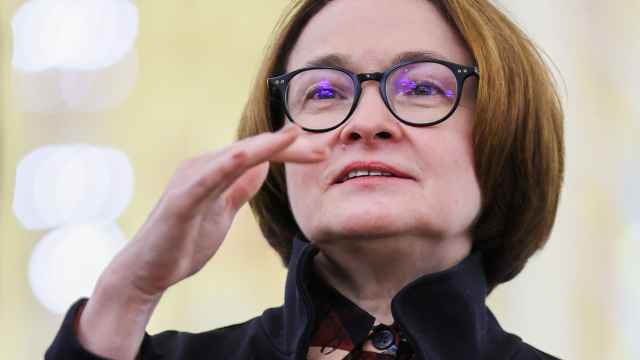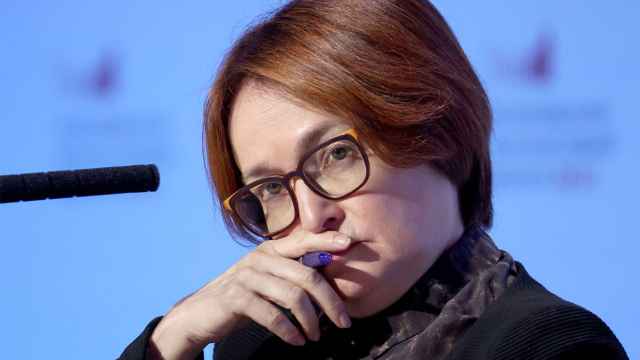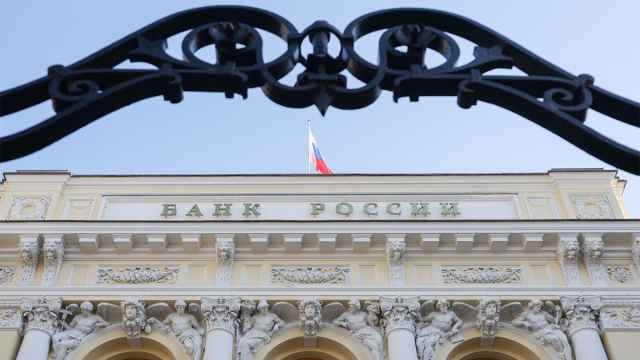Russia is acting on a pledge by President Vladimir Putin to shrink the role of the dollar in international trade as tensions sour between Washington and Moscow.
The shift is part of a strategy to “de-dollarize” the Russian economy and lower its vulnerability to the ongoing threat of U.S. sanctions. But while the central bank was able to quickly dump half of its dollar holdings last year, progress in trade has been slow due to ingrained use of the greenback for many transactions.
The share of euros in Russian exports increased for a fourth straight quarter at the expense of the U.S. currency, according to central bank data. The common currency has almost overtaken the dollar in trade with the European Union and China, and trade in rubles with India has surged. The dollar’s share in import transactions remained unchanged at about a third.
“There’s been a strong incentive to change, not just for Russia but for its trading partners too,” said Dmitry Dolgin, an economist at ING Bank in Moscow. “The European Union is also now facing trade pressure from the U.S.” pushing it to try to reduce dependence on the dollar, he said.
The euro came close to replacing the dollar as the currency of choice for Russian exports to the European Union, with its share climbing to 42% in the first quarter from 32% a year earlier.
Russia still relies on the dollar for more than half of its $687.5 billion in annual trade, though less than 5% of those deals are with the U.S. Part of Russia’s motivation to shift is that companies suffer delays on as much as a third of international payments in dollars because Western companies have to check with the U.S. whether the transactions are allowed, Russian Finance Minister Anton Siluanov said in December.
The euro’s share also increased in Russia’s $108bln in annual trade with China, jumping to more than a third of export settlements in the first quarter from almost nothing at the start of 2018. This shift, which covers commodity sales and big state contracts, has been accelerated by the development of payment infrastructure at the central bank and other lenders, according to Sofya Donets, an economist at Renaissance Capital in Moscow.
Trade in yuan is difficult because of capital restrictions that limit foreigners’ access to Chinese assets, Dmitry Timofeev, who heads the Finance Ministry’s sanctions department, told the RBC newspaper.
“The yuan isn’t completely convertible, which means it can’t play a significant role in world trade,” Timofeev said.
The most dramatic shift is visible in Russia’s $11bln in trade with India. The ruble accounted for three quarters of total settlement in exports between the two emerging markets after they agreed on a new payment method through their national currencies for multi-billion-dollar defense deals.
“The trend is likely to continue because the infrastructure for transactions in alternative currencies is improving,” Renaissance Capital’s Donets said. “Russia won’t be able to give up using the dollar completely though, especially for trade of oil.”
A Message from The Moscow Times:
Dear readers,
We are facing unprecedented challenges. Russia's Prosecutor General's Office has designated The Moscow Times as an "undesirable" organization, criminalizing our work and putting our staff at risk of prosecution. This follows our earlier unjust labeling as a "foreign agent."
These actions are direct attempts to silence independent journalism in Russia. The authorities claim our work "discredits the decisions of the Russian leadership." We see things differently: we strive to provide accurate, unbiased reporting on Russia.
We, the journalists of The Moscow Times, refuse to be silenced. But to continue our work, we need your help.
Your support, no matter how small, makes a world of difference. If you can, please support us monthly starting from just $2. It's quick to set up, and every contribution makes a significant impact.
By supporting The Moscow Times, you're defending open, independent journalism in the face of repression. Thank you for standing with us.
Remind me later.






